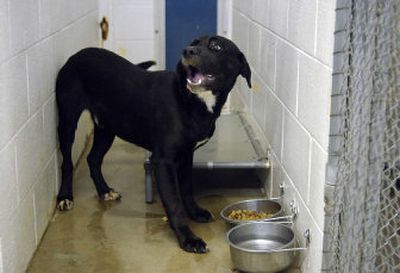Life in a shelter

Rachel is standing in the doorway of her room, quietly watching the activity in the hallway. She looks willing to engage anyone who stops by, but people seem to be either too busy or coming to visit someone else. Rachel’s family brought her to this strange place and left her behind because Rachel could no longer keep pace with her active family. She doesn’t have any other problems. She would just rather take a nap than go for a swim.
If Rachel, a 9-year-old chocolate Lab mix, knew taking frequent naps would land her in a local shelter, maybe she would have tried harder to keep up.
In another kennel at Spokane County Regional Animal Protection Service, an Akita named Bear is also trying to get used to his new environment. His owners have surrendered him to the shelter because he might dig up their new backyard landscaping. Digging has never been a behavior problem in the 11 years that the family has owned him but they didn’t want to take the chance.
A scan of the kennel cards attached to the doors of the dog cages in any of our local shelters reveals why these dogs are separated from their families.
Strays, those whose owners are unknown, make up about half the dogs. The rest have been surrendered by their owners. The reasons for the surrender are often heartbreaking and sometimes seemingly callous.
The story of the family who took their cat to the shelter because it no longer matched the décor of their newly remodeled home is legendary among area shelter staff, but it is not typical.
A study conducted by a team of investigators with the National Council on Pet Population and Policy listed the top four reasons for relinquishing: moving, landlord issues, cost and no time.
Patricia Simonet, development and program coordinator at SCRAPS, agrees with that list but said, “the primary reason given for the surrender is moving but when probed, the owners will also admit to a behavior problem that to them has become unmanageable.”
Equipped only with television images of well-trained dogs or the memory of the carefree dog they had as children, people can have unrealistic expectations of dog behavior and lack the skills to change that behavior. When inexperienced people attempt to train dogs, they may use techniques geared toward teaching humans. These approaches have little impact on canine behavior and in many cases make things worse.
Only 3 percent of dog owners train their pets, according to a 2005 survey by the American Pet Products Manufacturers Association. There are 43.5 million American households that own 73.9 million dogs. That is 71.7 million dogs in this country that have been brought into homes and never given any consistent training. Instinctively dogs bark, dig and chew things. They are social animals and when left alone, they become anxious or bored and resort to those activities for comfort or entertainment. Dogs are frequently surrendered when these behaviors become an irritant.
In the survey, 52 percent of people believed animals misbehaved to spite their owners, yet dog behavior specialists say that dogs are incapable of revenge. The problem is more likely that we have not communicated with the dog.
Dog training can be frustrating without a basic knowledge of how dogs learn. Francine Moniz, director of the Kootenai County Humane Society said that “training increases the bond between people and their dogs. When the bond is strong people are more likely to try and work things out. Due to lack of space we sometimes have a waiting list of people wanting to relinquish their dogs to us.
“We offer training suggestions to remedy behavior problems while they are waiting. Often times it helps, and people change their minds.”
If Rachel had received the training that she needed, she might have been able to sleep in peace, instead of in a cage.